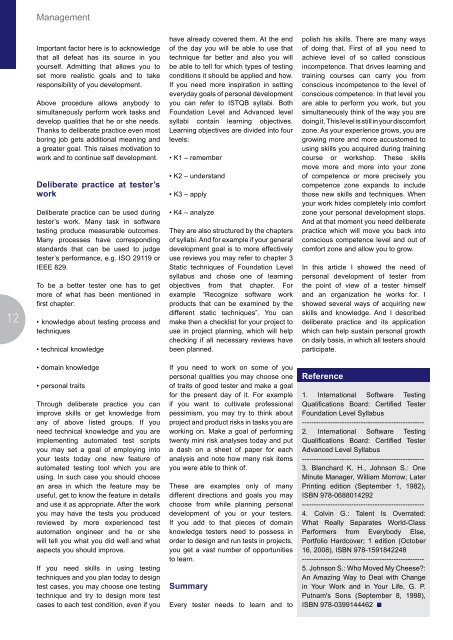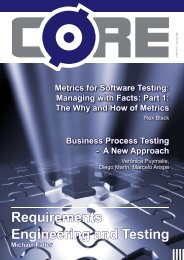Comparison of Change Management Systems
Comparison of Change Management Systems
Comparison of Change Management Systems
Create successful ePaper yourself
Turn your PDF publications into a flip-book with our unique Google optimized e-Paper software.
12<br />
<strong>Management</strong><br />
Important factor here is to acknowledge<br />
that all defeat has its source in you<br />
yourself. Admitting that allows you to<br />
set more realistic goals and to take<br />
responsibility <strong>of</strong> you development.<br />
Above procedure allows anybody to<br />
simultaneously perform work tasks and<br />
develop qualities that he or she needs.<br />
Thanks to deliberate practice even most<br />
boring job gets additional meaning and<br />
a greater goal. This raises motivation to<br />
work and to continue self development.<br />
Deliberate practice at tester’s<br />
work<br />
Deliberate practice can be used during<br />
tester’s work. Many task in s<strong>of</strong>tware<br />
testing produce measurable outcomes.<br />
Many processes have corresponding<br />
standards that can be used to judge<br />
tester’s performance, e.g. ISO 29119 or<br />
IEEE 829.<br />
To be a better tester one has to get<br />
more <strong>of</strong> what has been mentioned in<br />
first chapter:<br />
• knowledge about testing process and<br />
techniques<br />
• technical knowledge<br />
• domain knowledge<br />
• personal traits<br />
Through deliberate practice you can<br />
improve skills or get knowledge from<br />
any <strong>of</strong> above listed groups. If you<br />
need technical knowledge and you are<br />
implementing automated test scripts<br />
you may set a goal <strong>of</strong> employing into<br />
your tests today one new feature <strong>of</strong><br />
automated testing tool which you are<br />
using. In such case you should choose<br />
an area in which the feature may be<br />
useful, get to know the feature in details<br />
and use it as appropriate. After the work<br />
you may have the tests you produced<br />
reviewed by more experienced test<br />
automation engineer and he or she<br />
will tell you what you did well and what<br />
aspects you should improve.<br />
If you need skills in using testing<br />
techniques and you plan today to design<br />
test cases, you may choose one testing<br />
technique and try to design more test<br />
cases to each test condition, even if you<br />
have already covered them. At the end<br />
<strong>of</strong> the day you will be able to use that<br />
technique far better and also you will<br />
be able to tell for which types <strong>of</strong> testing<br />
conditions it should be applied and how.<br />
If you need more inspiration in setting<br />
everyday goals <strong>of</strong> personal development<br />
you can refer to ISTQB syllabi. Both<br />
Foundation Level and Advanced level<br />
syllabi contain learning objectives.<br />
Learning objectives are divided into four<br />
levels:<br />
• K1 – remember<br />
• K2 – understand<br />
• K3 – apply<br />
• K4 – analyze<br />
They are also structured by the chapters<br />
<strong>of</strong> syllabi. And for example if your general<br />
development goal is to more effectively<br />
use reviews you may refer to chapter 3<br />
Static techniques <strong>of</strong> Foundation Level<br />
syllabus and chose one <strong>of</strong> learning<br />
objectives from that chapter. For<br />
example “Recognize s<strong>of</strong>tware work<br />
products that can be examined by the<br />
different static techniques”. You can<br />
make then a checklist for your project to<br />
use in project planning, which will help<br />
checking if all necessary reviews have<br />
been planned.<br />
If you need to work on some <strong>of</strong> you<br />
personal qualities you may choose one<br />
<strong>of</strong> traits <strong>of</strong> good tester and make a goal<br />
for the present day <strong>of</strong> it. For example<br />
if you want to cultivate pr<strong>of</strong>essional<br />
pessimism, you may try to think about<br />
project and product risks in tasks you are<br />
working on. Make a goal <strong>of</strong> performing<br />
twenty mini risk analyses today and put<br />
a dash on a sheet <strong>of</strong> paper for each<br />
analysis and note how many risk items<br />
you were able to think <strong>of</strong>.<br />
These are examples only <strong>of</strong> many<br />
different directions and goals you may<br />
choose from while planning personal<br />
development <strong>of</strong> you or your testers.<br />
If you add to that pieces <strong>of</strong> domain<br />
knowledge testers need to possess in<br />
order to design and run tests in projects,<br />
you get a vast number <strong>of</strong> opportunities<br />
to learn.<br />
Summary<br />
Every tester needs to learn and to<br />
polish his skills. There are many ways<br />
<strong>of</strong> doing that. First <strong>of</strong> all you need to<br />
achieve level <strong>of</strong> so called conscious<br />
incompetence. That drives learning and<br />
training courses can carry you from<br />
conscious incompetence to the level <strong>of</strong><br />
conscious competence. In that level you<br />
are able to perform you work, but you<br />
simultaneously think <strong>of</strong> the way you are<br />
doing it. This level is still in your discomfort<br />
zone. As your experience grows, you are<br />
growing more and more accustomed to<br />
using skills you acquired during training<br />
course or workshop. These skills<br />
move more and more into your zone<br />
<strong>of</strong> competence or more precisely you<br />
competence zone expands to include<br />
those new skills and techniques. When<br />
your work hides completely into comfort<br />
zone your personal development stops.<br />
And at that moment you need deliberate<br />
practice which will move you back into<br />
conscious competence level and out <strong>of</strong><br />
comfort zone and allow you to grow.<br />
In this article I showed the need <strong>of</strong><br />
personal development <strong>of</strong> tester from<br />
the point <strong>of</strong> view <strong>of</strong> a tester himself<br />
and an organization he works for. I<br />
showed several ways <strong>of</strong> acquiring new<br />
skills and knowledge. And I described<br />
deliberate practice and its application<br />
which can help sustain personal growth<br />
on daily basis, in which all testers should<br />
participate.<br />
Reference<br />
1. International S<strong>of</strong>tware Testing<br />
Qualifications Board: Certified Tester<br />
Foundation Level Syllabus<br />
----------------------------------------------------<br />
2. International S<strong>of</strong>tware Testing<br />
Qualifications Board: Certified Tester<br />
Advanced Level Syllabus<br />
----------------------------------------------------<br />
3. Blanchard K. H., Johnson S.: One<br />
Minute Manager, William Morrow; Later<br />
Printing edition (September 1, 1982),<br />
ISBN 978-0688014292<br />
----------------------------------------------------<br />
4. Colvin G.: Talent Is Overrated:<br />
What Really Separates World-Class<br />
Performers from Everybody Else,<br />
Portfolio Hardcover; 1 edition (October<br />
16, 2008), ISBN 978-1591842248<br />
----------------------------------------------------<br />
5. Johnson S.: Who Moved My Cheese?:<br />
An Amazing Way to Deal with <strong>Change</strong><br />
in Your Work and in Your Life, G. P.<br />
Putnam's Sons (September 8, 1998),<br />
ISBN 978-0399144462



